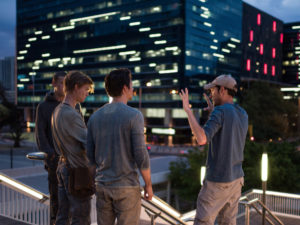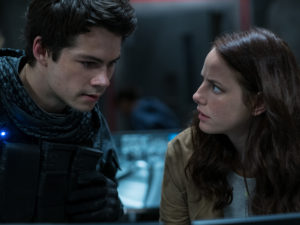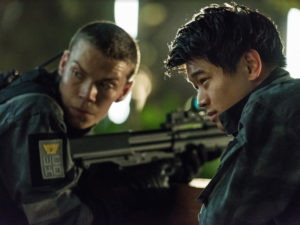
In 2011, when an unknown short film entitled Ruin roamed the internet, it caught the attention of the studio executives at Fox, which led to the discovery of such a talent in Florida native, director Wes Ball. As Initial meetings ensued between the director and the studio, simultaneously someone had handed him The Maze Runner book and asked him what he would do with it. The newcomer immediately took the book home, fell in love with the concept, and then came back and pitched it, explaining how it resembled the brotherhood in Lord of the Flies along with supporting images. This leap of faith from the studio jumpstarted Ball’s Hollywood career to direct the entire Maze Runner franchise which includes The Maze Runner, Maze Runner: The Scorch Trials, and Maze Runner: The Death Cure. It’s a rare sight to see one director attached to an entire trilogy series, let alone a first-time director. This places Ball in the esteemed company of the greats, such as George Lucas and Peter Jackson.
The Maze Runner books are written by novelist James Dashner. The novelist gave free reign to the screenwriter T.S. Nowlin and the director to make whatever adjustments necessary. The core cast in the three films comprise of Dylan O’Brien as Thomas, Ki Hong Lee as Minho, Thomas Brodie-Sangster as Newt, Kaya Scodelario as Teresa, and the return of Will Poulter as Gally along with additional characters throughout.

Pleasing the fans of the books is of top priority and perhaps the most challenging aspect in any adaptation. “The fanbase is the reason we have the series. It was important for me to not betray them, to not change the book so much that they felt like we disappointed them,” Ball emphasized.
Duplicating each page verbatim doesn’t necessarily translate into good screen time for a pleasing movie experience. The franchise director explained, “They all progressively get a little more different in terms of the books. The first movie is pretty close to the books. The fans might say that the second movie is the most different than the book. I would maybe argue because it still follows the core concepts, still follows how they get out of the maze, and how they meet these different characters along the way. We invented a different engine for the third movie which was rescuing Minho, which was not in the book. I felt I needed something that would drive the main characters in a way that the books didn’t have. By the end of the series, we ended up getting back in line especially with the books.”
For any trilogy, therein lies the natural progression of the characters. Ball expounded, “The first movie was like high school. There were a group of characters still being monitored by adults and being forced into a situation, confined within a boundary they are prohibited to leave. In the second movie, they’ve left the comfort of their existence, their home world, and now they’re bumping up against things they have no control over and meeting people they don’t know and can’t trust. It’s about testing those choices and ultimately having to be responsible for those choices, much like the college years. Lastly, the third movie is about finally stepping into being an adult where things are great, complicated, and not quite so black and white but a little bit greyer. Ultimately, the last movie is defining who these characters want to be seen as. That’s the journey. It’s that character growing up in adulthood, finding that ‘the trees are messy’, [meaning issues aren’t clear cut in life, but more complex].” Ball concluded, “It’s also the idea that family is what you have. Your friends and family are going to help you survive and get you through this.”

The final installment of the series, Maze Runner: The Death Cure is considered the best made movie of the three according to the filmmaker. “It’s laser focused on the people that have seen the previous two. It’ll be fun to watch all three movies on a run and experience it as one long journey.”
Just as the iconic classics Jurassic Park, The Goonies, and Raiders of the Lost Ark have culturally impacted a generation, Ball hoped aloud, “As the years roll on, I think people will remember our movies more so than others, because it’s a fun genre movie. Our movies are extremely well acted, executed with fine craftsmanship, have fun adventures, and don’t mirror the problems of the day. They’re timeless stories.”





